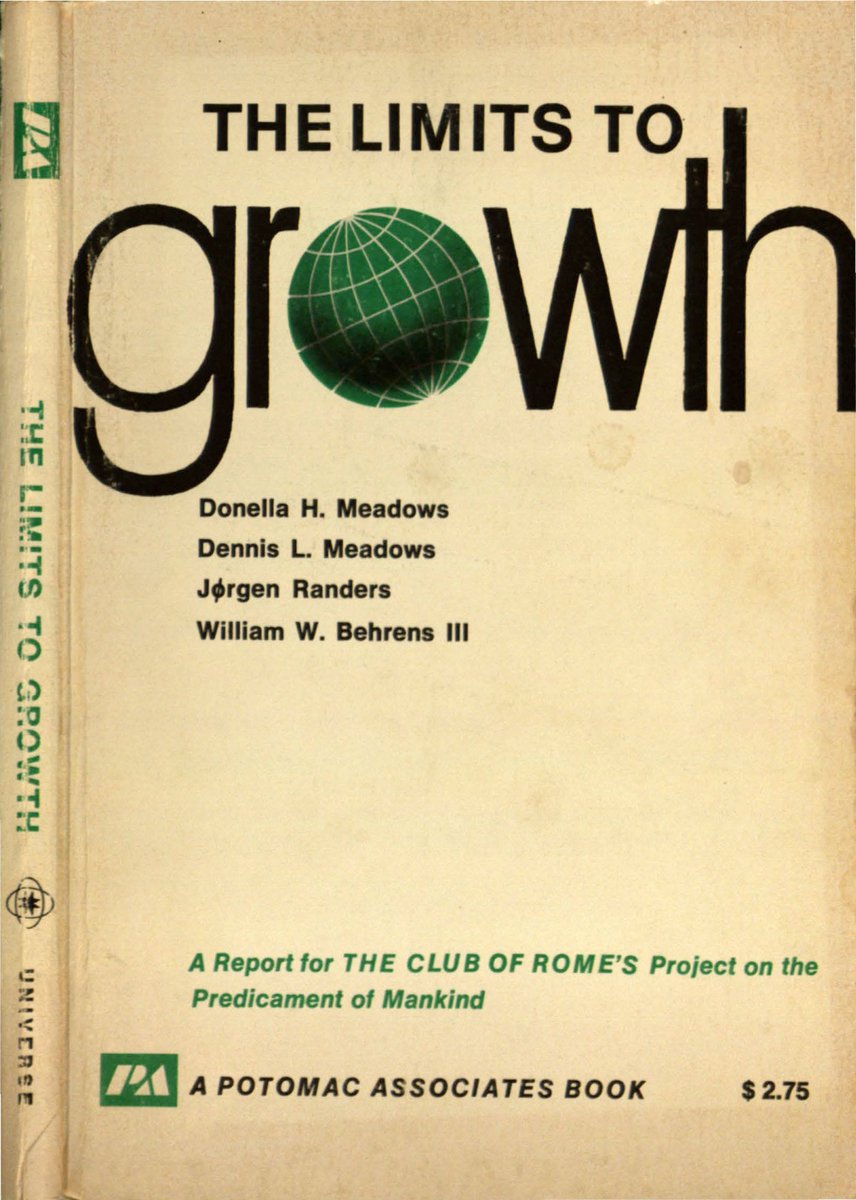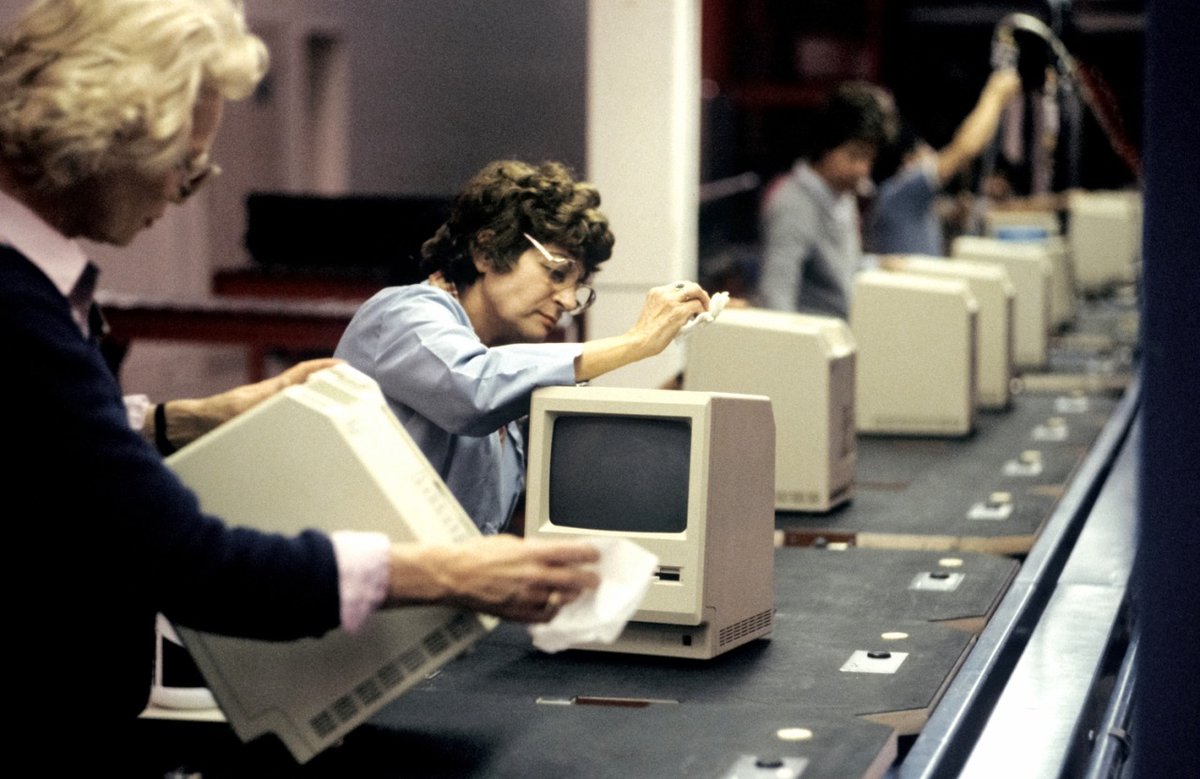In 1972, the Club of Rome published "Limits to Growth," which used pretty straightforward modeling to predict that the world& #39;s productive capacity would be exhausted soon.
https://en.wikipedia.org/wiki/The_Limits_to_Growth
1/">https://en.wikipedia.org/wiki/The_...
https://en.wikipedia.org/wiki/The_Limits_to_Growth
1/">https://en.wikipedia.org/wiki/The_...
But over the years, the limits in Limits to Growth have proven to be more complicated. Capitalists have many failings, but one thing that they can be relied upon to do, wherever possible, is reduce the costs that they incur.
2/
2/
Oftentimes, cost reductions can be realized by externalizing: polluting, overseas dumping, exploiting labor. Sometimes, cost reductions come from reducing quality or quantity while holding prices steady.
3/
3/
Our electronics are cheaper because they& #39;re made by companies in China whose labor practices drive employees to suicide. When they were made by unionized labor onshore, they cost more.
https://en.wikipedia.org/wiki/Foxconn_suicides
4/">https://en.wikipedia.org/wiki/Foxc...
https://en.wikipedia.org/wiki/Foxconn_suicides
4/">https://en.wikipedia.org/wiki/Foxc...
For years, the late, lamented Consumerist blog documented the "Grocery Shrink Ray" whereby common packaged goods got smaller while their prices held steady.
https://consumerist.com/tag/shrink-ray/index.html
5/">https://consumerist.com/tag/shrin...
https://consumerist.com/tag/shrink-ray/index.html
5/">https://consumerist.com/tag/shrin...
Meanwhile, the private equity fuckwits who took over J Crew destroyed its staples like the Cece ballet flat, replacing the stitching with glue and substituting inferior materials - increasing profits by cutting costs without cutting prices.
https://www.npr.org/transcripts/861378110
6/">https://www.npr.org/transcrip...
https://www.npr.org/transcripts/861378110
6/">https://www.npr.org/transcrip...
But capitalists also realize savings by redesigning products so that they they use less labor, energy and materials. Compare a stone house to a modern efficient home: the labor, energy and material inputs per cubic meter have been in freefall for generations.
7/
7/
It& #39;s not because capitalists are environmentalists, it& #39;s because they& #39;re cheap. I love this study of Ikea catalogs that found that the SKUs that endure become more materially efficient over time:
https://www.frbsf.org/economic-research/files/BaxterLandry.pdf
8/">https://www.frbsf.org/economic-...
https://www.frbsf.org/economic-research/files/BaxterLandry.pdf
8/">https://www.frbsf.org/economic-...
The Billy bookcase you bought this year is visually and functionally equivalent to the ones I assembled at a bookstore in 1991, but they& #39;re lighter (less material), pack smaller (eking out improvements in the knapsack problem), and are composed of parts from fewer suppliers.
9/
9/
The same is true of cars, clothes, and other categories of goods. Capitalism doesn& #39;t care how it reduces costs (material, energy and labor are the major costs), and it uses a mix of benign and harmful techniques to achieve these reductions.
10/
10/
All of this leads capitalism& #39;s true believers to conclude that capitalism is compatible with planetary survival: left to its own devices, capitalist& #39;s cheapness will reduce material and energy inputs, and the carbon footprint of our goods will fall even as our economy grows.
11/
11/
One such believer is MIT Sloan& #39;s Andrew McAfee& #39;s "More From Less: The Surprising Story of How We Learned to Prosper Using Fewer Resources—and What Happens Next."
https://www.simonandschuster.com/books/More-from-Less/Andrew-McAfee/9781982103576
12/">https://www.simonandschuster.com/books/Mor...
https://www.simonandschuster.com/books/More-from-Less/Andrew-McAfee/9781982103576
12/">https://www.simonandschuster.com/books/Mor...
McAfee& #39;s critics say he has it wrong. As @NafeezAhmed writes in @motherboard, "scientific analysis by a group of systems scientists and economists who have advised the United Nations seems to pull the rug out from under this entire enterprise."
13/
13/
The critique is "Raising the bar: on the type, size and timeline of a & #39;successful& #39; decoupling," published in
Environmental Politics.
https://www.tandfonline.com/doi/abs/10.1080/09644016.2020.1783951?journalCode=fenp20&
14/">https://www.tandfonline.com/doi/abs/1...
Environmental Politics.
https://www.tandfonline.com/doi/abs/10.1080/09644016.2020.1783951?journalCode=fenp20&
14/">https://www.tandfonline.com/doi/abs/1...
(Here& #39;s the @Sci_Hub mirror:)
https://sci-hub.tw/downloads/2020-06-25//95/10.1080@09644016.2020.1783951.pdf
15/">https://sci-hub.tw/downloads...
https://sci-hub.tw/downloads/2020-06-25//95/10.1080@09644016.2020.1783951.pdf
15/">https://sci-hub.tw/downloads...
The authors say McAfee cherry-picks his stats, missing instances in which the growth that seems to happen without increased consumption is actually just externalizing - consuming resources somewhere else, off the manufacturer& #39;s books (but still on Earth& #39;s ecological ledger).
16/
16/
They also say that McAfee fails to acknowledge that even where there& #39;s growth without increased consumption, that there& #39;s a Red Queen& #39;s Race: when things get cheaper (because of increased material/energy efficiency), we buy more of it.
17/
17/
This is a familiar pattern: making it easier to travel increases traffic, which erases the gains from the new travel method. Uber and Lyft first increased mobility in cities, then they paralyzed them:
https://www.sfgate.com/technology/article/Uber-Lyft-San-Francisco-pros-cons-ride-hailing-13841277.php
18/">https://www.sfgate.com/technolog...
https://www.sfgate.com/technology/article/Uber-Lyft-San-Francisco-pros-cons-ride-hailing-13841277.php
18/">https://www.sfgate.com/technolog...
It& #39;s why traffic speeds in London today are barely faster than they were in the pre-internal combustion era.
https://www.forbes.com/2008/04/21/europe-commute-congestion-forbeslife-cx_po_0421congestion.html
19/">https://www.forbes.com/2008/04/2...
https://www.forbes.com/2008/04/21/europe-commute-congestion-forbeslife-cx_po_0421congestion.html
19/">https://www.forbes.com/2008/04/2...
The critique of "uncoupled" growth is correct, but incomplete.
It& #39;s easy to imagine a city that uses internal combustion for mass transit but not private cars - and massively increases landspeed relative to horses.
20/
It& #39;s easy to imagine a city that uses internal combustion for mass transit but not private cars - and massively increases landspeed relative to horses.
20/
The barrier to such a city isn& #39;t tech or economics: it& #39;s ideology. No one came down off a mountain with two stone tablets saying "Thou shalt own a personal automobile." Rather, car companies corrupted urban planning to reduce transit and make us reliant on cars.
21/
21/
Likewise, it& #39;s possible to imagine an economic system in which manufacturing relentlessly reduces material/energy inputs while banning externalizing (cheating) and limiting new consumption.
22/
22/
. @Leigh_Phillips& #39;s "Austerity Ecology & the Collapse-Porn Addicts" describes this in detail. It& #39;s a call for a Promethean Left that demands technology to sustain the planet while giving peasants the lives of lords, not reducing lords to peasants.
https://boingboing.net/2016/01/12/keep-your-scythe-the-real-gre.html
23/">https://boingboing.net/2016/01/1...
https://boingboing.net/2016/01/12/keep-your-scythe-the-real-gre.html
23/">https://boingboing.net/2016/01/1...
If we can reform our ideology to prevent capitalism from wrecking the planet, why stop there? Why not harness technology to give us better allocations that enable plenty without waste?
https://locusmag.com/2017/03/cory-doctorow-the-jubilee-fill-your-boots/
eof/">https://locusmag.com/2017/03/c...
https://locusmag.com/2017/03/cory-doctorow-the-jubilee-fill-your-boots/
eof/">https://locusmag.com/2017/03/c...

 Read on Twitter
Read on Twitter



